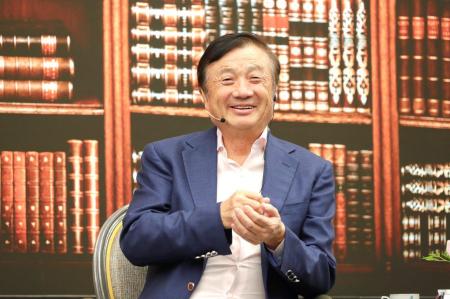Ren Zhengfei, CEO and founder of Huawei, hosted an open discussion alongside other prominent guests examining the role of innovation and trust in the future of the information, communication and technology (ICT) sector. He stated that technology will continue evolving in an unpredictable manner and emphasized that there was no need to feel uneasy about this. “We should embrace this new era with great courage,” said Zhengfei.
Zhengfei was joined in the discussion by computer scientist, futurist, and serial entrepreneur Jerry Kaplan; Professor Peter Cochrane OBE, innovator, academic, and consultant, and Zhang Wenlin, President of Corporate Strategy Department, Huawei.
When asked how he saw the future, Zhengfei commented: “I believe that society is on the eve of another explosion of new theories and technologies. Technology will continue evolving in a manner that we cannot predict yet. We can’t tell what the trends of the future will be.”
Artificial intelligence, however, will have a large role to play. “AI will certainly start being applied on a large scale,” said Zhengfei. “It will just create greater wealth and generate higher efficiency for society as a whole. AI will be the core variable that will influence and shape a country’s future capabilities and bring disruptive changes to that country. This means AI will fundamentally change how the international community develops. With support from infrastructure that includes supercomputers, super-large storage systems, and ultra-high-speed connectivity, humanity will welcome a new level of prosperity.”
Speaking on AI’s impact on society, Kaplan said: “AI is not magic. It’s not really about intelligence at all. It’s simply a new wave of automation. To understand what’s going to happen with AI, you simply have to look at previous waves of automation. While automation disrupts labor markets, it doesn’t cause the jobs to disappear. New jobs will be created. As we become wealthier, demand will be created. We get a new middle class and new demands for goods and services. And in fact, automation will change the nature of labor, not put people out of work.”
Cochrane discussed the purpose of AI and the ICT sector. “What are we trying to do? First of all, we have to try and create sustainable societies. To do that, we have to get away from the idea that we can polish and improve what we’ve got. It won’t work. Transformation demands biotech, nano tech, AI and robotics, and the Internet of Things. Because anything we create for the future has to be recycled, repurposed, reused, and the only way we can orchestrate this is with the IoT. We have to stop producing more and more for the few, and we have to start providing sufficient for the many. If we do not, we will never see a stable planet where people are living equitable lives. There is sufficient on this planet to support every human, but with the technology we have right now, we stand to destroy our ecosystem. So, we have to change the way we live and the way we do things.”
Within the past year, levels of trust in technology, particularly AI and 5G, have been challenged. On this point, Zhengfei referred to how, hen the first train was introduced to China, people thought that they were powered by ghosts and couldn’t figure out how they ran – but that now no-one complains about them at all. “Now people are very concerned about AI,” he said. “They are worried that AI will cause unemployment, disrupt social structures, and distort our ethics. They worry too much. Advancements in technology have helped us create more wealth. 5G itself is a tool, just like the ballast beds that train tracks are laid on. That’s all it is about. People should have more trust and tolerance towards new things. The most prominent feature of innovation is that it gives everyone academic freedom, allowing people to explore.”
“People have concerns, fears, and high expectations for technology,” said Wenlin. “I think the best way forward is to have an open discussion about the nature and stages of technology with people like sociologists, scientists, regulators, and tech companies. With more dialogue among industry players, I think we will work out a trustworthy management framework based on a more reasonable and clear understanding of technology. Then we will help more people understand technology and see it in a rational way. As tech companies, we should do everything in our power to take on complexity ourselves, enable our users to understand the key nature of technology and the rights they have, and give them more choices. This way, we will gradually earn users’ trust and continue building trust from society as a whole.”




